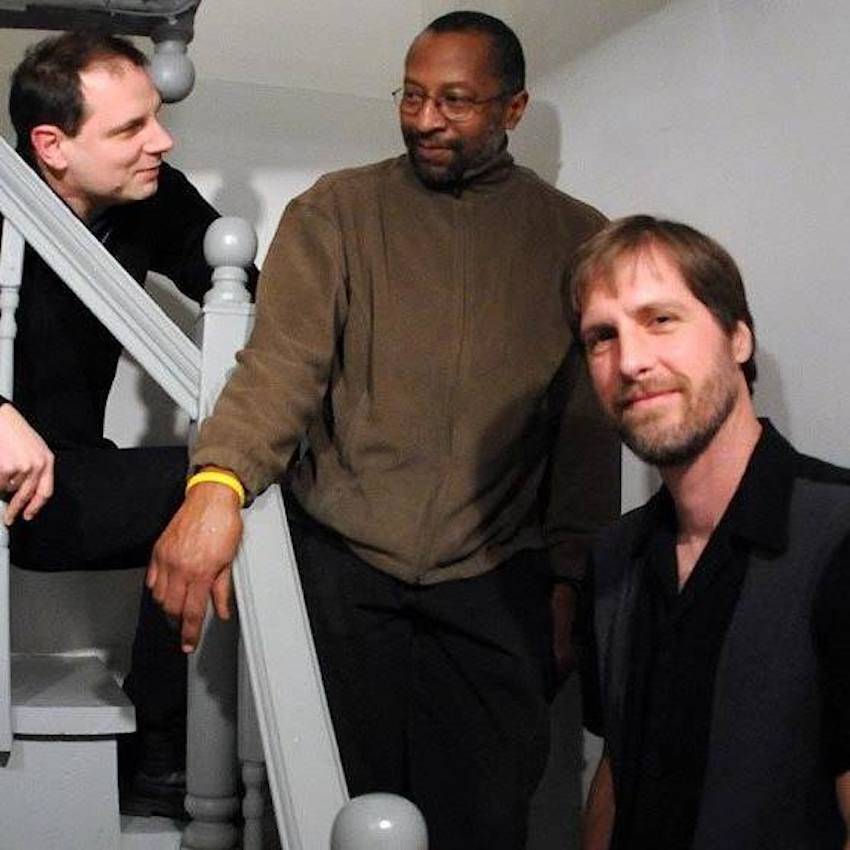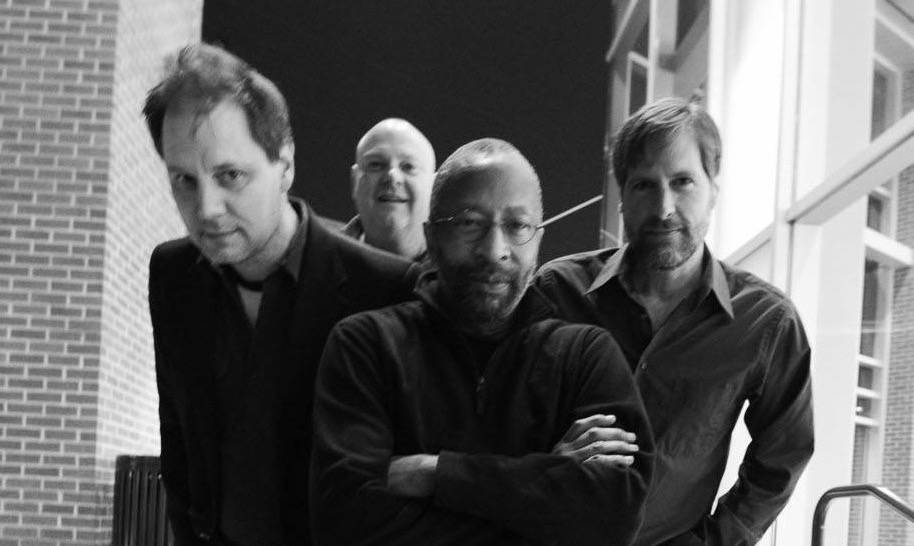He’s wearing a metallic-red Fender Jazzmaster, a guitar that would otherwise standout on stage. But on Tommy O’Donnell, it seems to blend in with his person like an extension of his body. Nearby, a dark wooden pedalboard contains sparkling, multi-colored boutique-guitar-effect stomp-boxes and pedals. A lifeline runs from O’Donnell to the board, from the board to a Vox AC-30 amplifier, comfortably resting in a powerful flight-case. The sound that issues forth from O’Donnell is akin to a language — dense, fluid and communicative.
Tommy O’Donnell’s career in music has been spent working in bands such as The Something Brothers, The Spelunkers, and Inktrail. However, he has preferred to have his creativity centered on playing as opposed to composition, functioning more like a session-musician who floats between acts. Yet, whatever the setting, his playing always contains something that is uniquely himself. His own style is not only preserved, but integral. His use of parts of the guitar not intended for deliberate sound is a hallmark of his style. Allowing those parts to become possible instruments in themselves.
The guitar and the guitarist are ubiquitous to pop music. For many, it’s the starting point to their careers: it’s less expensive and it’s easy to get down the basics and make noise quickly. For professional players, virtuosity and musical personality can hidden by the guitar’s prevalence. So many play guitars, but not very many play them uniquely. O’Donnell is an exception, a committed artist to an almost monastic degree. He puts creativity where it should be for all performers: as an all-encompassing ethos. I sat down with O’Donnell to chat with him and ask him about his personal style.
Smile Politely: Have you always defied the idiomatic nature of the guitar in your playing?
Tommy O’Donnell: I learned all the standard things that a lot of players use. And at some point, I figured I had to know the rules in order to start breaking them — in order to play what was in my head, all the fundamentals had to be in place. I think my playing stems from the kind of music I like and gravitate towards, which is usually off the beaten path a bit.
SP: Your style seems stylistically diverse, and as a consequence, it is technically well-rounded. Did this happen organically, or was it the result of a deliberate method?
O’Donnell: It mostly happened organically and again, in response to what I liked as a listener, which varies heavily from most every movement that happened in rock and roll during the 50s [to the] 90s, to early folk, real blues, jazz, and classical. From there, my technique probably mirrors a lot of what I find interesting in music — which sometimes can be pretty technical and then turn around and be butt-simple and perhaps even primitive sounding.
SP: Do you feel that position of that guitar as the titan of pop and rock is extinct? It seems there’s been a void where trend-shifting guitarists used to be. How do you account for this?
O’Donnell: I think there are so many great players out there doing cool things that the “titan of the guitar” moniker won’t go away. It is after all a folk instrument — a people’s instrument — and one you see in a lot of households. Also, with internet, access to players, lessons, and YouTube now, most secrets are out of the bag. If you want to learn a certain technique or song, someone [has] probably got a video on how to do it. Any void may have to do with lack of originality or [of] quality songs. Technique has reached all new heights on the guitar; but, one thing rock and roll has proven is that guitar prowess and technique doesn’t sell records. But great guitar ideas do.

Image from the Inktrails’ Facebook page.
SP: Which musical projects have interested you more than others, and why?
O’Donnell: I do like projects where I might be brought in just to do what I do and the song writing is already taken care of. Like playing with Ike Reilly. I have done many records and tours with him. He is singular and could care less how fast someone can play, it is what you play. I also like thrown-together country or jazz gigs when everyone knows the songs and there is no rehearsal needed. Conversely, most of my time musically has been spent putting endless hours into bands, songs, tours, [and] records with original bands, where, frankly, practicing as a group has a huge payoff.
SP: Guitarists seem to constantly restructure their personal equipment. What comprises your stage set up?
O’Donnell: I always am rearranging my live set up. But, for the most part, the sound variance I go for is the amplifier that I choose for a given situation. I’m not going to take a Marshall to country gig for example. Guitars, though, I mainly play my telecasters or my JazzMaster. I use Les Pauls in the studio and occasionally for rock gigs.
SP: Are there any new products that have become essential tools in your bag?
O’Donnell: Not really. I am always switching out gear and pedals, but nothing is essential except a tuner, really.
SP: Where do you hope to take your playing in terms of artistic evolution?
O’Donnell: I always just let the song ideas guide the guitar playing — whether its stuff I’m writing for the Something Brothers, which will usually have a rock and roll edge, or stuff I am writing for my instrumental trio, Inktrail. I think the songs first will tell me what needs to be done on the guitar parts. I don’t write songs around a certain technique or thing I can do necessarily.
SP: Which do you feel comes first: musical trends or musical preferences? How does individual musicianship fit into this process?
O’Donnell: I think it depends on the individual. Some follow trends, some don’t care about [them]. I have always considered myself to fit in the latter category, which is probably the reason I’ve never sold a lot of records too. Ha.
SP: The guitar seems to appeal to people on multiple levels, more so than most other instruments. Be it technical proficiency, a perceived alpha dominance on stage, or the sheer artistry. Where do you see your playing fitting in to that?
O’Donnell: I’d like to think it is artistic. But it depends on where my music meets the listener. For some, it may be strictly artistic. For guitar players, sometimes it might be something more technical that may bring them to a show, and that’s fine too. “Alpha dominance” has never been my strong suit, so I doubt if that is my big calling card.
SP: What’s next for you?
O’Donnell: I am working with my pals in the Something Brothers who have been my friends for 3 decades — we are currently recording a colossal new record – lots of songs. Inktrail is still writing instrumental, indulgent guitar songs and hopes to record this year. I am still working with Ike Reilly when he calls me. And spending time with my family.
You can hear guitarist Tommy O’Donnell play with the Something Brothers on thier latest album, 2018’s APOLLO, here. You can also learn more about his avant-garde jazz trio, Inktrail, here.
This interview has been edited for clarity and ease of reading.








